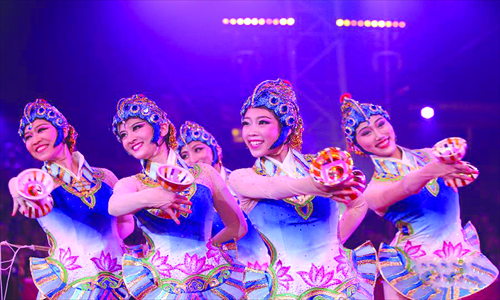Agile alterations

China National Acrobatic Troupe blazes market-oriented trail - to Africa
Like many other traditional Chinese performing arts, for a long time acrobatics has developed within the government's warm embrace. There was no need to venture into the competitive jungle on its own.
Though many domestic troupes have the opportunity each year to perform for foreign audiences, most of the arrangements come from bilateral cultural exchange agreements made at the government level. And while these activities promote mutual cultural understanding, they do not lead to the healthy development of a troupe's long-term competitiveness.
Luckily, recent days have witnessed some domestic troupes summon up their courage to test themselves under market conditions. Take the China National Acrobatic Troupe (CNAT) as an example. Their two-week engagement in South Africa, which just ended on February 3, was completely set up through market operations without any subsidies from the government.
"Going out is not a problem anymore for domestic art troupes. The real challenge is how to stand firm on the international stage, to realize stationary performances in a certain location," said Zhang Huangnan, director of marketing from CNAT.
"Few of the other domestic troupes have tried to conduct market operations during their overseas performances," he added.
As one of the many domestic troupes undergoing the transformation from being State-owned to operating independently, the attempts by CNAT also blaze a trail for this whole big group.
Performing to perfection
Whatever business models they adopt, it's the product that matters most. To impress audiences in South Africa, CNAT chose to perform show called Fantastic Beijing. It includes diabolo juggling, bowl and plate spinning as well as "ball catching," which is a lot more difficult than it sounds.
Among those works, diabolo juggling recently won the Golden Clown award at the 37th Monte-Carlo International Circus Festival in Monaco, which was held from January 17 to 27.
The full name of the show is Pretty Hua Dan - the Diabolo, in which several girls are dressed up as hua dan (a young female character in Peking opera), and do all kinds of difficult movements, like skipping and catching the diabolo on pyramids, or spinning three times before catching it.
Mainly performed by the men in the troupe, "pagoda of bowls" is one of the most difficult forms of acrobatics offered by CNAT. It was awarded the Golden Clown at the 28th Monte-Carlo International Circus Festival in 2004.
After a series of breathtaking throws and catches, the pile of bowls are held tightly by the feet of a female acrobat standing on her head. And she is perched atop three men standing on each other's shoulders like a human pagoda. Key movements in the process include "non-stop hand throwing and catching," "single hand balancing," and "throwing to the fourth level."
Though the other two performances require less difficult skills, they are no less pleasant to watch. "Ball catching" is different from traditional ball juggling since the balls are constantly bounced off the floor and acrobats are required to catch them while climbing up and down the stairs.
"Audiences in Johannesburg didn't know much about Chinese acrobatics before as Western audiences in the Europe and US where we have performed many times," said Zhang, "One person this time even watched our show six times."
New business model
Though presenting 566 performances in 29 different countries in 2012, CNAT has a long way to go to realize stationary performances in foreign markets. "Only by establishing a business cooperation model with our foreign partners under market mechanisms can our troupes stage long-term performances there," said Zhang.
The model, in Zhang's words, can be summarized as "profits portioning" between the performance troupe and local contractors. He explained that currently most Chinese troupes are still following the old model when performing overseas.
In the old system, foreign partners are responsible for the performers' air travel expenses and accommodation, but the final box office of the performance falls totally into their pockets.
This time, according to the agreement with their partners in South Africa, CNAT was responsible for its own air tickets, as well as the production costs including the stage setting.
On the other side, local contractors covered their accommodation, publicity, and rental cost of the stage. Finally, the two sides split the box office, with CNAT taking an 80 percent share.
"Though the final result was not very satisfactory this time (basically making ends meet), we learned our lesson with this first step," said Zhang. "For example, the publicity work involving communicating with local media before the performance is very important, especially the week before. And also, during our (two-week) run there, we found that some traditional Chinese handicrafts sold very well."
Since starting to transform from a State-owned institution in 2006 under the government's guidance for cultural enterprises, CNAT has undergone a long process to wean itself off government support. It is like many other similar domestic cultural enterprises that want to seek breakthroughs both at home and abroad.
Foothold in Africa
Its performance in South Africa this time was not CNAT's first performance in the continent. In early 2012, it toured South Africa, Zambia and Lesotho.
"Chinese culture used to not have many presentations in Africa, but local audiences' enthusiasm for acrobatics has encouraged us to have more hopes for the potential of this market," said Zhang Hong, general manager of CNAT.
Compared to the economic cooperation between China and Africa, cultural exchanges are lagging behind.
"We used to have many performances in Europe and the US where the performance market is already very mature," said Zhang Huangnan, "but in Africa, local audiences still don't know much about traditional Chinese culture."
In Zhang's view, South Africa is the best place to establish their influence in the continent. "It is relatively wealthy, possessing a stronger audience base for the performing arts. That's also part of the reason we chose to try our first market operation there," he explained.